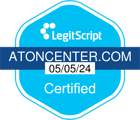One of the most powerful ways to impact our recovery is to change our state of mind. Mindfulness is being in the present, feeling our bodies and what is happening now. Rather than allowing ourselves to be distracted by past events or worrying about the future, we focus entirely on what is happening in that moment. This allows us to be more authentic and effective in our lives. But how will mindfulness help me?
Achieving Mindfulness
Meditation is the most common way to achieve mindfulness. Meditation guides us through the process of focusing our attention on one thing, such as our breathing. In doing so, we are also removing distracting thoughts from our minds. The actual act of steering our minds back from distraction strengthens our mind’s ability to focus each time we redirect ourselves, not unlike muscle memory in our bodies. As we learn to achieve mindfulness, there are many skills and benefits we can develop:
• Focus – the ability to focus allows us to truly be in the present moment and clear our minds of all other distractions. It also allows us to mentally step away from emotions and past memories so that we are seeing only what is in front of us.
• Clarity – when we meditate, we can achieve clarity. Seeing the present without judgment or emotion allows us to make decisions about what is happening with coherence and transparency.
• Observation – within mindfulness we learn the powers of observation. To look at what is before us without judgment or emotions, simply to notice what we see, feel, hear, taste, and touch. By practicing observation, we naturally become better at seeing life without attaching those emotions or judgments.
• Non-reactive – Meditation teaches us to be non-reactive. Our reactions to our environment are usually based on past experiences and the emotions tied to them. When we learn not to react, the world looks different to us and we interact differently with our world.
• Non-judgmental – it is human nature to make judgments about things based on what we have learned. What we have learned is often based on the judgments and learnings of others. So our judgments can literally be based on centuries of ignorance. Letting go of judgment allows us to observe things just as they are.
Mindfulness in Recovery
Within recovery, mindfulness is a very powerful tool. It is one we can learn to access on our own at any time, and it has an immediate impact on our situation. Living mindfully consistently also has long-term benefits for our healing. It can become a way of life that also fortifies us against substance relapse or other old habits.
• New Thought Patterns – if our old thought patterns led us to substance abuse, then keeping those ways of thinking will likely return us to numbing out. Mindfulness allows us to look at the world with new eyes and form our own new ways of thinking which will fortify us against relapse.
• Control Cravings – mindfulness teaches us skills that allow us to acknowledge and dismiss our cravings for substances. Rather than allowing the craving to grow and perseverating on it, we can train our minds to focus on the present until the craving goes away. When we take advantage of this tool, it is a very powerful way to control our cravings.
• Manage Emotions – meditation helps us to learn to manage our emotions. When we meditate, we can learn to detach our emotions from events, which helps our day-to-day function as we react to what is going on around us without reaching a crisis state. We can learn to react based on what is actually happening rather than learned emotional responses.
• Nurture Relationships – relationships often suffer during substance abuse. In recovery, we learn skills to help not only repair them but to strengthen and improve them. Mindfulness helps us to be in the moment with the people in our lives so that we can communicate better and interact based on what is actually happening rather than revisit the issues from our past.
• Stress Reduction – the very act of meditating reduces stress mentally and physically. Slowing down our bodies and minds and focusing on relaxation and breathing has physiological benefits that help us to heal from addiction. Additionally, continued meditation brings peace into our daily lives, allowing us to live a more mindful life both in our minds and in our bodies.
Mindfulness is Living with a Higher Purpose
When we actively choose mindfulness, we are choosing to live our lives with a higher purpose and create more meaning in our lives. We learn to live in the present and manage our emotions as well as our cravings. By looking at the world without judgment and not allowing our past to dictate our future, we can find more joy each day. We become more mindful of others and the world around us. We become more aware of our purpose and how we can impact the world.
AToN Center supports mindfulness in recovery. Daily meditation is available to help train our minds and bodies to live in the present and live in more authentically. Mindfulness supports other methods of healing and can be the cornerstone of your recovery. Are you ready to explore mindful living to help with your recovery? Discover the ways that mindfulness will help you.
Find your higher purpose at AToN Center today. Call (888) 535-1516 to access more focus, clarity, and purpose in your life.
Originally posted on December 16, 2019 @ 3:15 pm


















